- Home
- Joanne Harris
A Cat, a Hat, and a Piece of String Page 2
A Cat, a Hat, and a Piece of String Read online
Page 2
‘Not any more,’ said Monkey. ‘The Rapids belong to the Catfish gang.’
There was a silence as I let that flow past me. Monkey ate his dough ball, watching me with that look in his eyes, expecting me to cry, perhaps, I don’t know. Anyway, I didn’t give him that satisfaction. ‘You just the errand boy,’ I told him haughty. ‘Where’s the General?’
He gave a shrug in the direction of the stonebreakers. ‘Don’t go there, Ngok,’ he warned as I began to climb down towards the path. ‘You not welcome.’
‘You want to stop me?’ I shot over my shoulder.
Monkey shrugged again, and followed me at a distance, limping. ‘You’ll see,’ was all he said, and even then I pretended not to hear him.
I found the others down by the rockbreakers. Catfish wouldn’t look at me, and Hollywood Boy was playing jump-stone across the swim-hole and pretending cool. ‘Monkey tells me you don’t want me on the Rapids any more,’ I said, attacking straight away, before Catfish could find his voice.
Catfish said nothing, just picked at his feet and wouldn’t look.
‘Cat got your tongue?’ I said.
Catfish muttered something about not wanting to hang with little girls.
‘The Rapids are mine as much as yours,’ I said, hearing that sound in my voice again, halfway between tears and devil-fish rage. ‘You can’t stop me if I want to be here.’
But he could, and he knew it. Three against one; besides, on land they were bigger and older and stronger than me, even coward Monkey with the bent foot. Still, I didn’t care. Let them try, if they were men enough. I fingered my devil-fish tooth on its wire and prayed; devil-fish, send me your spirit to make me strong.
‘Go home,’ said Catfish.
‘You want to stop me? You just try.’ And then a sudden inspiration halted me, fresh and strong as a voice from God. God or devil-fish, anyway, I couldn’t tell, but it was so clear that it took my breath, and then I started laughing, gaspy-style, till the boys must have thought I was crazy.
‘Why you laughing, Ngok?’ said Hollywood Boy, looking a little uncomfortable now. He should be; I’d seen him try the Swallow just last week, and he took it wide, bumped over the Turtle and ended up on his face in a mudhole. Catfish is better; but Monkey never tries the long rides, and I knew I could beat any of them – maybe even Catfish – on a good day, and with the devil-fish tooth to bring me luck.
‘You want the Rapids for yourself?’ I said, still laughing. ‘We’ll make a deal, boy. We see who’s the best. We let the river decide.’
That made them stare. Monkey looked scared; Hollywood Boy laughed. Only Catfish was quiet, serious. ‘What you mean?’ he said at last.
‘I mean a challenge,’ I said. ‘The Catfish gang against the Ngok gang. Winner takes the Rapids. Loser goes back to Papa Plaisance.’
Monkey sniggered. ‘You got to be crazy,’ he said.
‘Crazy perhaps, but I can swim like a crocodile.’
Catfish frowned. He doesn’t say much, and when he does, people listen. He was the General, after all, and he knew that a good General can never turn down a challenge. Do that once, and people start to think you’re afraid. Twice, and nobody obeys orders any more. Three times, and you’re a dead man.
‘What kind of a challenge?’
‘The big one,’ I said at once. ‘The Deep.’
There was a long silence. Then Catfish nodded once. ‘OK,’ he said, and without looking back at me, he stood up and began to walk upriver towards Les Rapides.
Reaching the swimming place, I thought the Deep looked darker and more distant than ever before. The river was already swollen from last week’s rain; patches of water hyacinth, some as large as boats, rushed by on the sour-smell water. In a month the long rains will come; then the Rapids will be too dangerous to ride, even for a good swimmer. During the rainy months even crocodiles die in the tumbling rapids. Now was too soon for that time, though not too far away either, and I was beginning to feel a little nervous as we reached our strip – no customers eating there now, not yet, but a waiter laying out tables under the big mango tree, and the smell of roasting something drifting down from the open kitchen.
‘You sure?’ said Catfish, looking at me. His face was calm, but I thought he was sweating; maybe the heat, or maybe something else, too. Monkey stood at his side with the rubber ring under his arm, his eyes round open with all the whites showing.
‘You scared?’ I said.
Catfish shrugged, as if to suggest that the Deep was just another long ride to him and not the biggest, furthest and most dangerous section of the near Rapids.
‘OK then.’ We looked at each other.
‘You first.’
‘No, you.’
His face was like wood, stiff and brown and expressionless. ‘OK then. We go together.’
‘No, man,’ said Hollywood Boy in dismay. ‘That’s too risky!’ In a way, he was right; those long rides were safer when taken alone, for the distance has to be calculated absolutely precisely, and even an inch to the wrong side can mean a lethal sweep into a sinkhole’s gullet, or a battering run over the ankle-biters. Two swimmers together will clump, like weed islands, breaking the current and risking disaster.
‘All right,’ I said. ‘Both together.’
Even on a day with nothing to prove, we practise before we try the big runs. A couple of runs down the Slide, perhaps; a crocodile or two, some jumps, and then we are ready to try the Swallow. Today, there was none of that childishness. Monkey sat on the bank and watched, his legs tucked into his rubber ring; Hollywood Boy sat hunched under the arch of Les Rapides, and Catfish and I observed the river, occasionally throwing in objects – a plastic bottle, a piece of wood – to gauge the speed and the course of the distant Deep.
Neither of us wanted a practice run. It would have shown weakness, somehow; though I knew it made our chances of success so much smaller. By rights we should have done the Swallow a dozen times or so before we even attempted the Deep – but only the heat of my anger was keeping me there in the first place, and I didn’t want the river to put a damp on that before I was ready.
Twenty minutes, and I could feel it beginning to ebb. Catfish was still watching, testing wind speed and water, occasionally glancing quick-quick at me to see if I’d lost my nerve. I prayed again to the devil-fish god – speed, courage, luck – and shot Catfish a big, bright smile. I don’t know whether it fooled him; either way I wasn’t waiting any longer, and I stood up, tucked my skirt around my legs and tied it in place and said, ‘Ready?’
‘You crazy, man,’ said Monkey with gloomy satisfaction. ‘If the river don’t get you, the crocodiles will.’
‘Crocodiles don’t like fast water,’ I said, looking beyond him towards the far corridor. You could hardly see it now for reflections: a bare strip, smoother than the rest, simmering gold in the distant haze. It was pretty, I thought; pretty like the back of a shining snake. And like the snake, it had a bite.
‘Still ready?’ He was counting against it; I could see it in his eyes.
‘As ever,’ I said, and both together we stepped back to give ourselves maximum run. One-two-three steps, hands almost touching, and we were at the edge; a fourth and I flung myself far out into the air, riding far beyond the Slide, landing feet first with a plunk of air on to the tail of the Swallow.
I sank, went under; felt the tow of the river, far greater beneath than on the surface, and pulled my feet up fast. Catfish was somewhere very close, I knew; but I couldn’t afford to look for him just then. With all my strength I stretched out, leaning forward, kicking my feet, reaching for the current like a lifeline. Downriver the Turtle shrugged its giant pink shoulder out of the water and I struck out for the Swallow, knowing that if I reached the Turtle from the wrong side I would miss the opening, and be dragged into a mess of sinks and ankle-biters – that is, if the river didn’t crush me like a rotten egg.
Behind and to the left of me, further into the corridor, I could sense Catfish striking and pa
nting. He was strong, but he was heavy, too; I raised my feet from out of the drag-water and kicked along ahead, light as a lily. Neither of us spoke; there was water in my nose and mouth; water in my eyes and all I could think of was the corridor that drew me, spinning and gasping, closer to the Turtle and the sink on either side.
Bump-bump-bump. A little bump-slide, a string of round rocks scattered under the surface like the bones in a skinny man’s spine. I rode them, losing speed and breath, and then the Turtle was already on me, its smooth sweep of Swallow ride on the bank side, its rough tangle of uncharted territory on the other. I took a deep breath. Braced – and kicked out at the Turtle just as the river swelled me over the top, pushing out with my long strong legs and boosting myself into the unknown. The current was stronger here than ever before, sucking at my legs in hot–cold bursts, and there were stones here, stones and rocks I did not recognize, striking my feet and legs and skinning my left shin from instep to knee.
Ankle-biters. I’d expected no less; but these were whole-body ankle-biters, reaching up out of the depths like the teeth of the river. I tucked my legs up, kicking, and still they bit; behind me, Catfish cried out, but I could not see why. And still the Deep seemed twice as far, twice as fast as ever before, like some road in a story about castles that move and countries that vanish overnight only to reappear somewhere else, on the other side of the world, perhaps, under a magic cloud-carpet of snow.
Once more I prayed to the devil-fish tooth – bring me far, bring me fast – and boosted myself as hard as I could away from the rocky strip. Beside and behind me, I saw Catfish do the same; but as I shot forward I saw him slip – slide away towards a crookleg gully that swept back into the Swallow – while I sailed ahead of him, quick and straight as one of Papa Plaisance’s pirogues, over the danger zone and into fast, smooth water.
The Deep! I could see it now, and in my path; the curve of my course would lead me straight towards it now, using the very speed of the river to fling me across, as a boy may use a purse-sling to throw a stone. I opened my mouth in a blaze of triumph – Wheee! – then I sat on the river, hugging my knees the way Monkey does when he rides his rubber ring, and let the river take me, far out and far away, into the corridor.
It felt like flying. Flying and falling and dreaming all in one; with the heavy water riding black on yellow-brown beneath me, and small pieces of river debris stinging and lashing against my burning skin. But it was a wonder; for a moment there I was not simply in the river; I was the river; I sang its song; and the river sang back to me in its many voices, and if I’d wanted to, I believe I could have swum all the way over to Kinshasa and nothing – not even crocodiles – could have touched me.
And then I looked back. I shouldn’t have done it. I was almost there, my fingers combing the skirts of the Deep. But I looked round, perhaps to check if Catfish had seen my triumph, and the joy fell away from me in a sudden cold.
Catfish had slipped, as I’d first thought, into the crookleg gully that led back to the Swallow. If he’d stuck to that run, he would have been all right; it was a straight, smooth channel that bypassed the Turtle and brought the swimmer back into the long, clean corridor towards the swimming hole. But Catfish hadn’t stuck to the run. Instead he had tried to boost himself back; a desperate, impossible move against the current. The river had stopped him; first tumbling him on to his back, then dragging him back towards the Turtle, the rocks and the black sink between. Too late, Catfish had understood his mistake; I could see him clinging, all dark head and skinny arms, round an exposed spike of river rock as over him the water heaved and hurled, bucking like some bareback creature that does not want to be ridden. I saw all this in an instant: the angry river; Catfish clinging on for his life; the gullet of darkness below. With a little more speed, he could have made it past the sink; but he had lost his momentum and his nerve. Now he clung, slip-slipping on the greasy stone, and wailed soundlessly over the howl of the river song.
Before me, the Deep was an arm’s length away. Its song too was deafening – come to me, Ngok – but there too was my friend, and though it tore me inside to abandon the dare, I knew I could not leave him to be swallowed by the sink.
I pushed away, back into the rocks. For a second, the Deep clung to me, singing its song; then it spat me out as hard as a child spitting out a pawpaw seed, and I shot away, skimming the rocks with my knees, towards the Swallow. It was risky, I knew. I would have to follow Catfish most precisely, and without losing momentum, grab him from where he clung without letting the sink inhale us both. A second’s miscalculation and we would go under, never to surface. An inch to either side, and I’d miss him altogether. I prayed to the devil-fish one last time – oh please, devil-fish, may my aim be true – and taking a deep breath, sitting squarely on the wave and with my lungs filled to bursting, I skidded down the final run at top speed towards Catfish.
He must have seen what I was trying to do. He grabbed my hand and dropped his grasp from the rock, and I let my speed take us both, like bottles on the water, shooting right over the nasty sink-hole and into the harrow of ankle-biters.
‘Hold on, Catfish!’ I could hardly hear myself over the river song. But his hand was in mine and I held tight, both of us yelling as the rocks bit into our legs and feet. The river was laughing now, I could hear it; a low chuckle of rocks and pebbles, like drums around a campfire. And the Swallow was smoothing out again; slowing, easing out towards the swimming hole. The stones fell away under our feet; Catfish dropped my hand and began to swim, slow and limping-style, towards the shallows.
The others were waiting there for us, unsure of what they had seen.
‘What happen, man?’ said Monkey impatiently, as Catfish and I lay out on the dry stones of the rockbreakers’ flats and examined the cuts and scrapes on our legs.
I looked at Catfish. He didn’t look back. His face looked more wooden than ever, except for a big scrape over one eye that had probably come from his hitting that pointy rock.
‘Did you reach the Deep, Ngok?’ said Hollywood Boy, his voice quivering with excitement. ‘I thought I saw you, maybe, but you were too far for me to be sure—’
This was the time to speak, I thought. To reveal how I’d touched the Deep – actually touched it with the tips of my fingers, like a mythical fish no one ever catches except in dreams. If I told them, then I’d be General. Catfish would go home to Papa Plaisance. Les Rapides would belong to me.
Catfish still wasn’t looking at me. His face looked closed, like a rock.
‘Well?’ said Monkey. ‘Did you win?’
There was a long silence. Then I shook my head. ‘Nah,’ I said. ‘I nearly did, but the Swallow pulled me in. Call it a draw, man. Nobody won.’
Hollywood Boy looked disappointed. ‘Hey, Ngok,’ he said. ‘You lost your magic tooth.’
I reached for it then, but I already knew it was gone. Maybe the river took it back; or maybe it was the spirit of the devil-fish, taking what was due.
We still work the river, the four of us: Catfish, Monkey, Hollywood Boy and I. There was a little tension with Papa Plaisance at first, but Maman Jeanne unexpectedly took my side – unlikely, I’d have thought, but it seems Papa was in her bad books over some unpaid work.
The river is ours again, for the moment – at least that strip of it that runs from Les Rapides to the stonebreakers’ flats – and we work it every day, though no one has ever attempted the Deep since then. Maybe we will again, some day. Catfish is still the General, though he doesn’t give orders in quite the way he once used to, and I’ve seen a gleam in Hollywood Boy’s eye that tells me there may one day be another challenge. Not from me, though. Not again. Foolish to imagine I might ever have been a General – it’s bad enough trying to keep up with the boys – though I can see it in their eyes sometimes: that awe, that knowledge of something dared, some secret glimpsed, some glory almost won. One day, perhaps, I’ll find it again.
Meanwhile there’s always the river, as Maman Jeanne
says, with its sleepy silences and its terrible rage and its song that keeps on going, and going, and going, carrying spells and dreams and stories with it all the way into the belly of Africa and out again into the open, undiscovered sea.
Faith and Hope Fly South
In Jigs & Reels, I included a story called ‘Faith and Hope Go Shopping’, the tale of two indomitable old ladies living in a retirement home. I grew very fond of those two old ladies, and from the amount of correspondence I received about them, so did many of my readers. Since then, I have revisited them several times, and probably will again.
HOW NICE OF you to take the trouble. It isn’t everyone who would give up their time to listen to two old biddies with nothing much to do with themselves but talk. Still, there’s always something going on, here at the Meadowbank Retirement Home; some domestic drama, some everyday farce. I tell you, some days the Meadowbank Home is just like the West End, as I often tell my son, Tom, when he calls on his weekly dash to somewhere else, bearing petrol-station flowers (usually chrysanths, which last a long time, more’s the pity), and stirring tales of the World Outside.
Well, no, not really – I made that last bit up. Tom’s conversation tends to be rather like his flowers: sensible, unimaginative and bland. But he does come, bless him, which is more than you could say for most of them, with their soap-opera lives and their executive posts and their touching belief that life stops at sixty (or should), with all of those unsightly, worrying creases neatly tucked away. Hope and I know better.
You know Hope, of course. Being blind, I think she appreciates your visits even more than I do; they try to find things to entertain us, but when you’ve been a professor at Cambridge, with theatres and cocktail parties and May Balls and Christmas concerts at King’s, you never really learn to appreciate those Tuesday night bingo games. On the other hand, you do learn to appreciate small pleasures (small pleasures being by far the commonest) because, as some French friend of Hope’s used to say, one can imagine even Sisyphus happy. (Sisyphus, in case you don’t know, was the fellow doomed by the gods to roll a rock up a hill forever.) I’m not an intellectual, like Hope, but I think I see what he means. He’s saying there’s nothing you can’t get used to – given time.

 The Evil Seed
The Evil Seed Gentlemen and Players
Gentlemen and Players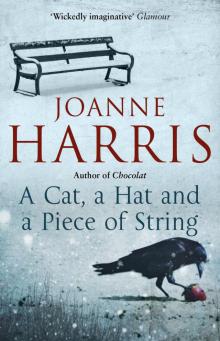 A Cat, a Hat, and a Piece of String
A Cat, a Hat, and a Piece of String Different Class
Different Class Chocolat
Chocolat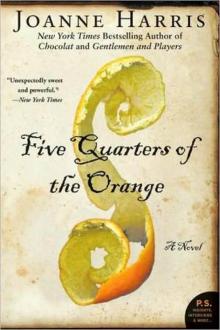 Five Quarters of the Orange: A Novel
Five Quarters of the Orange: A Novel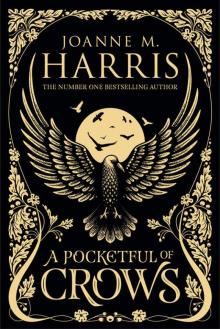 A Pocketful of Crows
A Pocketful of Crows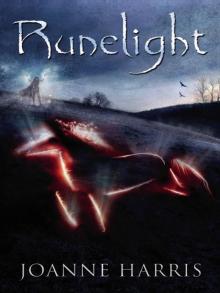 Runelight
Runelight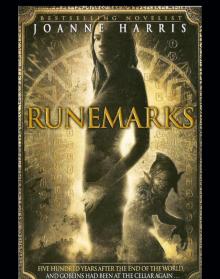 Runemarks
Runemarks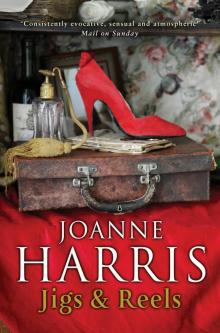 Jigs & Reels: Stories
Jigs & Reels: Stories Sleep, Pale Sister
Sleep, Pale Sister Holy Fools
Holy Fools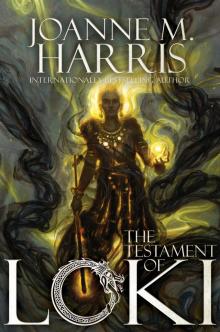 The Testament of Loki
The Testament of Loki Peaches for Monsieur Le Curé
Peaches for Monsieur Le Curé Blueeyedboy
Blueeyedboy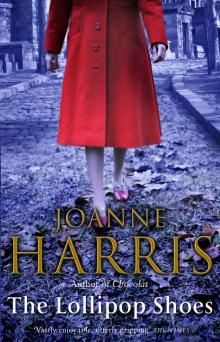 The Lollipop Shoes
The Lollipop Shoes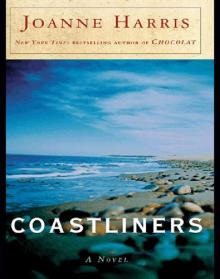 Coastliners
Coastliners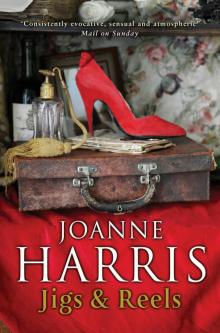 Jigs & Reels
Jigs & Reels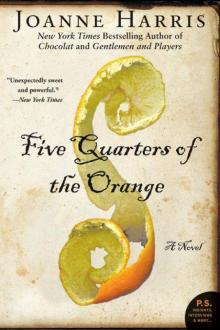 Five Quarters of the Orange
Five Quarters of the Orange